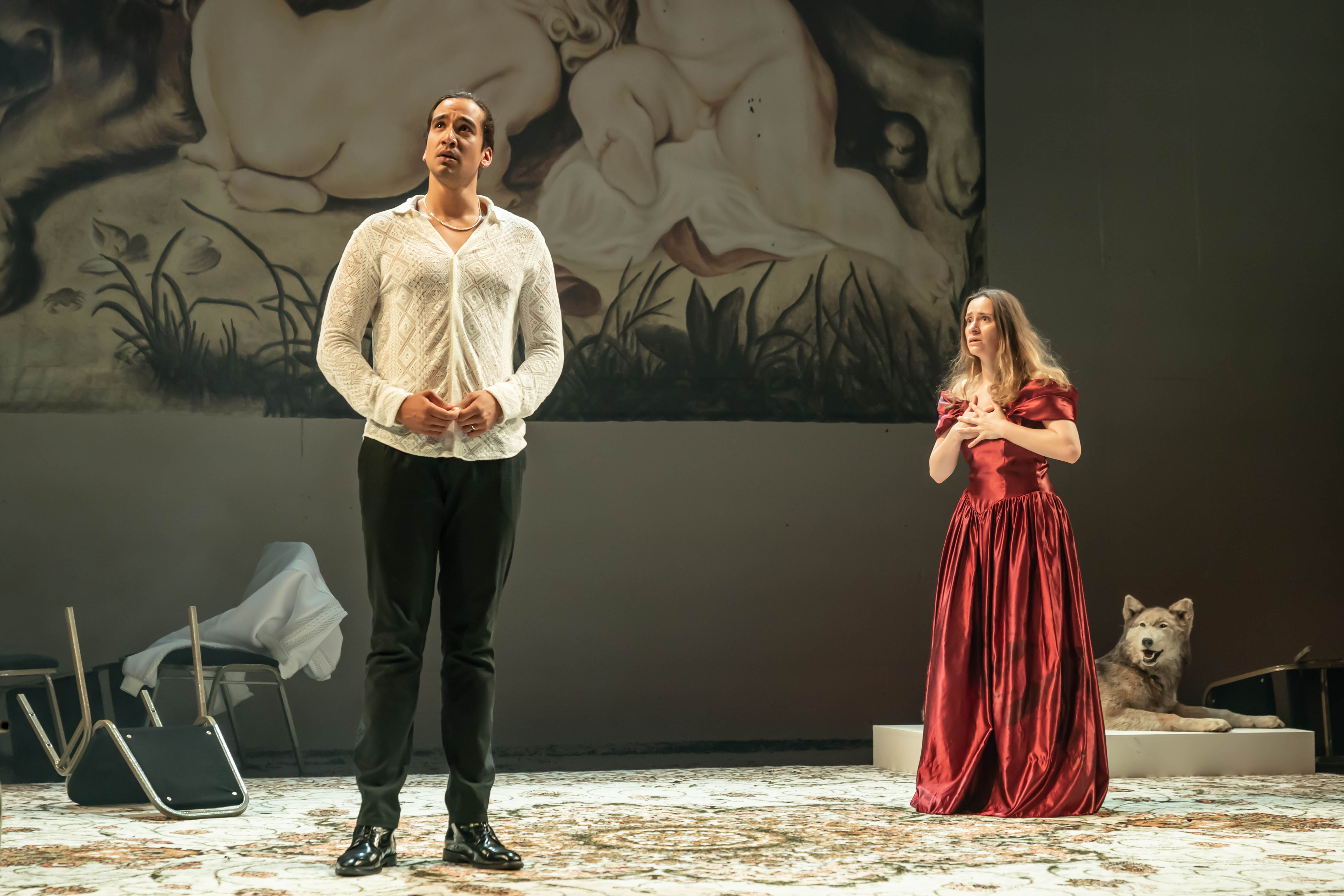
It was a long five years for Nathaniel Curtis. Having graduated drama school, the soon-to-be star of It’s A Sin struggled to find a decent acting gig and was forced to dabble in retail, education and charity work – “doing the rounds”, as he calls it. Quitting acting was not an option, though. He’d known that from an early age. “School was not a place for me,” he tells me. “It wasn’t a place where I was happy… I had different interests, but acting was always the one thing that I couldn’t see myself not doing.”
Finally Curtis’s patience paid off. He was cast as Romeo in a touring outdoor production of Romeo and Juliet in 2019. The ball started rolling. It was during rehearsals that he was called in to audition for “The Boys”, a new drama from Russell T Davies. The show would be renamed It’s A Sin and make the nation cry a thousand tears. Curtis and his castmates Olly Alexander, Lydia West, Omari Douglas and Callum Scott Howells became stars overnight.
The series was celebrated for portraying the ecstatic highs and devastating lows of London’s queer scene of the Eighties, the Aids crisis lurking ominously in whispers until it consumed everything. Told by a majority queer cast and crew, it was the most nominated show at the 2022 Baftas and (rightfully) hailed by many as one of the greatest shows of the century. As first TV jobs go, Curtis hit the jackpot.
“I had the most brilliant time on It’s A Sin,” he says. “I genuinely love [the cast]. I think that they are some of the most incredible people and I’m really proud of them... The fact that we were able to then make this thing together was just really, really lovely. From the read-through, we knew that there was a chemistry there.”
Curtis’s forthcoming roles include voiceover work for the Doctor Who universe and a role opposite Michelle Yeoh and Lenny Henry in Netflix’s The Witcher prequel series Blood Origin. First, though, Curtis is returning to the stage for his biggest role yet – the eponymous Britannicus in a new production at the Lyric Hammersmith. In Timberlake Wertenbaker’s adaptation of Jean Racine’s 17th-century tragedy, Britannicus has all the bad luck. The Roman empire has been taken from his rightful grasp, ripped away by his stepmother Agrippina and given to his stepbrother, Nero. The cast have given Curtis a nickname: “Poor Britannicus”.
Still, Britannicus isn’t bitter, Curtis tells me as we meet in the Hammersmith theatre before rehearsals. “He’s fully aware of what was meant to be his but he’s just getting through life,” he explains. “He’s watching all these things happen, aware that although he is, in some ways, powerless, he holds so much sway because he is a direct threat to the empire.” The production is set in modern-day Rome, the “corruption and politics and lines of succession” in the play feeling alarmingly familiar to our current world. “But then it’s also a world in which violence is an everyday occurrence,” Curtis says. “From the very first scene, the stakes are so high that, although it is modern dress, it’s not like today’s London.”
It’s been 11 years since Wertenbaker’s adaptation was last staged in London, meaning Curtis can put his own stamp on the character. After all, he points out, there’s room to take liberties, as “the real-life Britannicus was 14 when he died, and I’m very clearly not 14 years old at six foot five, and in my thirties”. Iconic roles such as Britannicus and Romeo never previously seemed like an option to him. “I’m so tall, I’m half-Indian [and] the opportunities weren’t really there five years ago. Now, because of the way the industry is changing and adapting, it’s really nice. I just want to try everything… I get to reinvent myself a little bit every time.”

Now, the roles Curtis is being invited to audition for get more interesting every time. That’s also undeniably due to his role as Ash, the puppy-dog-eyed sometimes-boyfriend of Alexander’s protagonist Ritchie in It’s A Sin.
The chance to work with Davies, the man responsible for rebooting Doctor Who in 2005, was unspeakably thrilling. “I think Russell has this immense talent of writing people in extraordinary circumstances, but they are so relatable,” he says. “All the Doctor Who characters, Rose Tyler, you just fall in love with them on screen because it’s just like, ‘Oh, I know that person’. And then you look at It’s A Sin and you know the characters. You know someone who is that person, you know someone who has fallen in love with that person… Getting that script through was just beautiful because it has Russell stamped all over it in the most glorious way.”
When filming began, Curtis had never been on a TV set before. But he and his co-stars, many of whom were also making their onscreen debut, were “incredibly well looked after”. “We were helped to do things that we didn’t know not to, like not falling over the camera on your first day, which I definitely did,” he says. “You hear about TV being just so go-go-go-go-go, but they were incredibly gentle with us. Obviously, this actual subject matter was so difficult at times, but it was made with the most unbelievable amount of love from absolutely everyone.”
It’s A Sin may have elicited rivers of tears from its viewers (a good 50 per cent of them from me, specifically), but it also prompted a nationwide conversation. Questions were asked and stories were shared about a tragedy often left out of history textbooks. At the same time, advances in the field (specifically the U=U campaign, which teaches that HIV-positive people with an undetectable viral load can’t pass it on to sexual partners), were heralded. “As an actor, I don’t think a lot of opportunities present themselves where people from all walks of life can relate to something you’ve done in that way,” Curtis says.

He continues: “It just really, really does show how much art means to people. I know that sounds really pretentious, but It’s A Sin was just a television show that I really enjoyed making and I loved and when it came out it … showed how much that story needs to be told … Section 28 wasn’t really something I’d ever really thought about because I was 12 in 2003 when it was repealed … They didn’t talk about how that had happened, it just changed and that was it.”
It’s A Sin arrived on our screens in January 2021, one month into what many called the hardest lockdown, when no end was in sight. Perhaps it’s this that made us connect so heavily with Ritchie and Co – the nation was emotionally wounded and desperately searching for an outlet for that pain. Curtis remembers the highs and lows of lockdown – waiting for this show to be released, aware it could change his life, while not knowing “what was going to happen” with his career.
“When lockdown happened, I think actors – not just actors; artists, singers, dancers – panicked. Everyone was really scared,” he says. Being back on stage now, he’s never been more grateful. “I think the way the industry is bouncing back is brilliant, not only are they trying to create such wonderful things, but they’re actually just trying to look after everyone at the same time. Because when you see your entire career vanish, it’s so scary.” Curtis may know how to wait. But now, the wait is over.
‘Britannicus’ runs at the Lyric Theatre until 25 June






